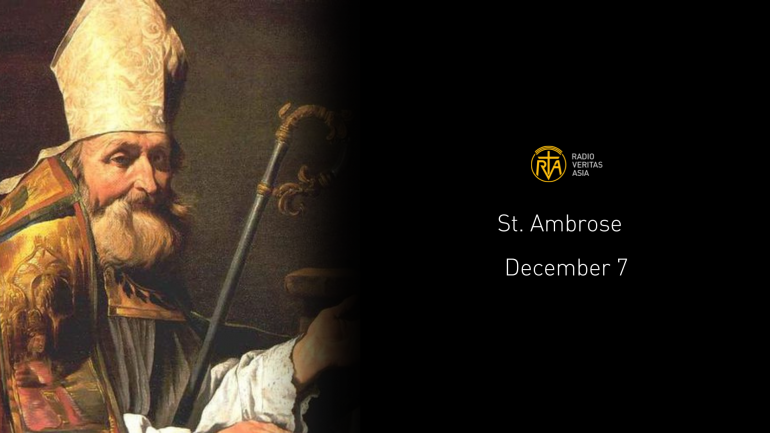St. Ambrose: The Bishop of Milan Who Fought Arianism

Arian theology holds that Jesus Christ is not a begotten Son and has not the same divine nature as the Father, but one who was created by the Father before the times.
This theology was originated by Arius, an Alexandrian presbyter, in the 4th century. It spread across the Eastern and Western Roman empires despite having been condemned as a heresy at the Council of Nicaea in 325.
At the time Ambrose was governor of Milan, the church was fragmented as a result of Arian theology.
When the bishop of Milan died, Ambrose as its governor attended the election for the new bishop to mediate in the conflict between the Nicene church and the Arians. While he was addressing the assembly, the participants called for him to become the next bishop.
The Arians knew of Ambrose' leaning toward the Nicene church, but they preferred him for being charitable leader in terms of theological issues.
But Ambrose declined the call as he was not yet theologically trained at the time, nor baptized. He hid in a colleague’s house. But his colleague turned him in. Then he was baptized, ordained and consecrated bishop of Milan in 374.
The Arians also assumed Ambrose would take their side since numerous Arians were associated with the government.
But Ambrose combated Arianism in ways he could.
He convinced Emperor Gratian to outlaw Arianism. In 379, Gratian banned Arianism across the Western Roman empire.
But four years later, Gratian was killed by Andragathius, who was Magnus Maximus’s magister equitum, at Lugdunum in 383.
Valentinian II, a Roman emperor, allowed the Arians to regain the churches. Valentinian II himself and his mother, Justine, were professed Arians.
When Ambrose protested the transfer of churches to the Arians he was ordered to appear before a council where he defended the Nicene church.
“If you demand my person, I am ready to submit: carry me to prison or to death, I will not resist; but I will never betray the church of Christ. I will not call upon the people to succour me; I will die at the foot of the altar rather than desert it. The tumult of the people I will not encourage: but God alone can appease it.”
Despite the imperial court’s dislike of Ambrose for his Nicene leaning, they requested him to stop Magnus Maximus, a Roman emperor who ruled Britain, Gaul, and Spain from attacking Italy. Ambrose spoke to Magnus. Ambrose succeeded. Magnus did not descend upon Italy at least at that time.
But the future efforts to prevent Magnus from taking Italy did not succeed. He took Milan. Valentinian II and his mother, Justine, fled. Ambrose decided to stay in Milan.
Arian theology was deemed to have stopped from spreading after the Councils of Constantinople and Aquileia in 381.
Arianism managed to survive among the Goths and Vandals, the Lombards, and the ruling elite of Visigothic Spain until the 7th century.
Ambrose was born into a Christian family in Trier in 339. Scholars debated over the identity of his father. Some believed his father was Aurelius Ambrosius, a praetorian prefect of Gaul. Others identified an official named Uranius as his father.
His mother was thought to have been a member of Aurelii Symmachi family.
Ambrose notable works include the
De officiis ministrorum (377–391),
Exameron [it] (386–390), and
De obitu Theodosii (395).
He died in Mediolanum in 397 at the age of 56 or 57.
Radio Veritas Asia (RVA), a media platform of the Catholic Church, aims to share Christ. RVA started in 1969 as a continental Catholic radio station to serve Asian countries in their respective local language, thus earning the tag “the Voice of Asian Christianity.” Responding to the emerging context, RVA embraced media platforms to connect with the global Asian audience via its 21 language websites and various social media platforms.












